Primjeri dobre prakse inovativnih metoda poučavanja
Autorica: Dajana Jelavić, profesorica engleskog jezika
Školska godina: 2024./2025.
Climate Change Project Plan
Click here to learn more about “Climate Change Project Plan”.
Adapting to Change: The Future of Mandarins, Olives, and Ziziphus Jujuba
Duration: 8 weeks
Participants: Dajana Jelavić,EFL teacher mentor/class 3b
- Research Question
How do climate change and environmental factors impact the growth and sustainability of olives, mandarin oranges, and Ziziphus jujuba in the Mediterranean region?
- Goals
- Analyze the adaptability of olives, mandarin oranges, and Ziziphus jujuba to climate change.
- Explore sustainable agricultural practices to mitigate the effects of environmental changes.
- Propose strategies for long-term agricultural sustainability in the Mediterranean.
- Hypothesis
If olives, mandarins, and Ziziphus jujuba are cultivated using sustainable farming methods, they will better withstand:
- Less rainfall
- Saltier water
- Higher temperatures
- Methodology
- Data Collection:
- Research climate impact reports (IPCC Interactive Atlas, Agroklub,IPCC climate science helper chatbot)).
- Analyze environmental needs of olives, mandarins, and Ziziphus jujuba (soil type, water requirements, temperature tolerance).
- Analysis:
- Use graphs to show how climate variables (temperature, precipitation) affect each crop.
- Compare future climate scenarios for the Mediterranean region.
- Case Study:
- Focus on local agricultural examples (Dalmatian region, Croatia).
- Sustainability Research:
- Identify water-efficient irrigation systems, organic soil conservation, pest management, and agroforestry approaches.
- Steps
| Step | Activity | Tools |
| 1 | Literature review on climate impacts | IPCC Atlas, ChatGPT tools, Perplexity, Agroklub |
| 2 | Crop needs and resilience research | Agricultural databases, scientific articles |
| 3 | Graph creation and data analysis | Excel, Canva, Google Sheets |
| 4 | Scenario modeling for 2050 climate predictions | NotebookLM, climate simulators |
| 5 | Propose sustainable strategies | Case studies, expert consultations |
| 6 | Conclusion and recommendations | Report writing |
- Expected Results
- Ziziphus jujuba will show greater resilience to drought and heat compared to olives and mandarins.
- Productivity of olives and mandarins will decline without adaptation strategies.
- Sustainable farming techniques will significantly improve resilience and yields.
- Conclusion
Mediterranean agriculture must adapt by:
- Investing in drought-resistant crops like Ziziphus jujuba.
- Implementing sustainable practices.
- Raising awareness among farmers and policymakers.
- Final Outputs
- Research report with graphs and future scenarios.
- Presentation (PowerPoint).
- Possible educational campaign or poster exhibition about sustainable agriculture.

AI 4 the gifted
Click here to learn more about “AI 4 the gifted”.
Say: Cheese!
Click here to learn more about “Say: Cheese!”.
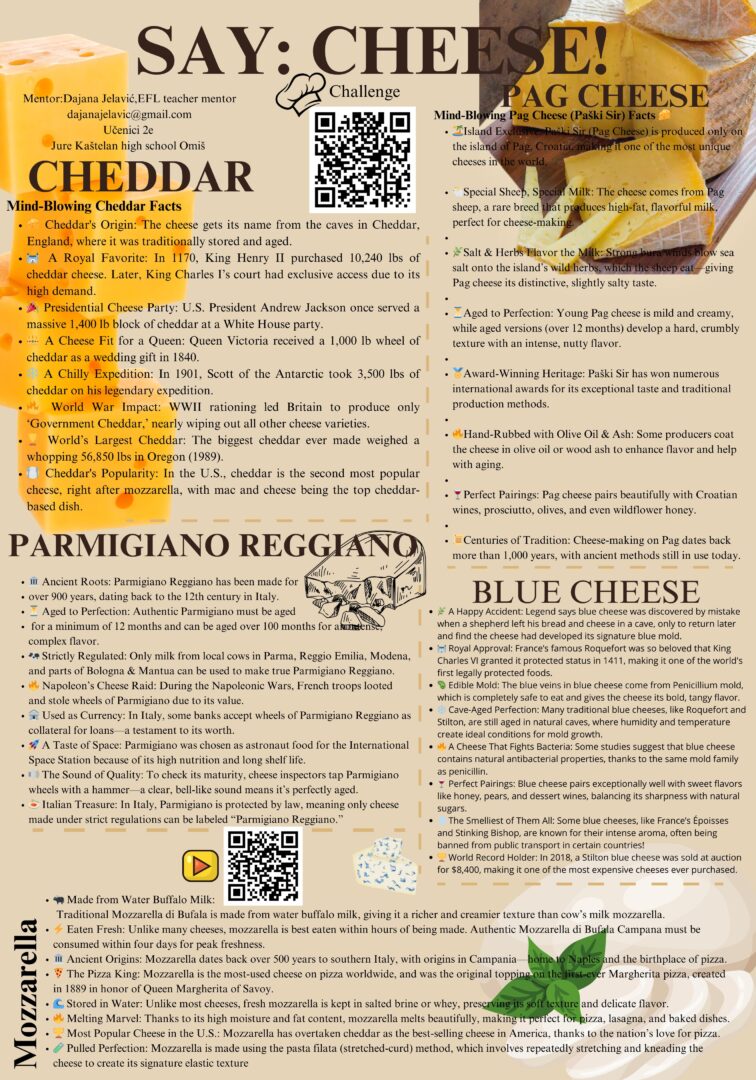
Digital Sustainability
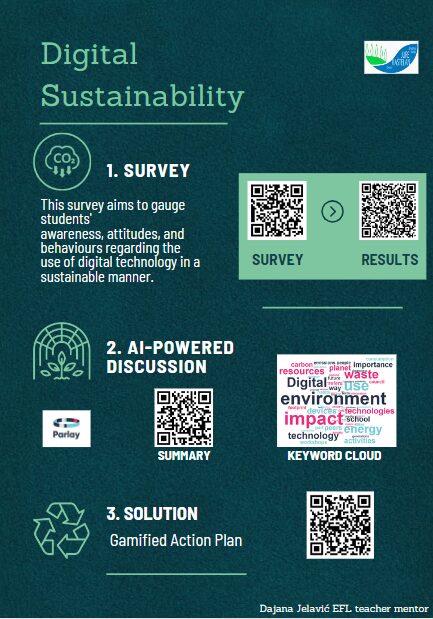
Click here to learn more about “Digital Sustainability”.
Dream Task with Four Cs
Click here to learn more about “Dream Task with Four Cs”
Hajduk

Click here to learn more about “Hajduk”
Redesign social media for well-being
Click here to learn more about “Redesign social media for well-being”.
Literary Tweets-Exploring Literature through Twitter
Click here to learn more about “Literary Tweets-Exploring Literature through Twitter”.
PBL Radio Programme
Click here to learn more about “AI 4 the gifted”
Podcast u nastavi engleskog jezika
Klikom ovdje saznajte više o projektu “Podcast u nastavi engleskog jezika”.
Speaking activity - Ban or Not-TikTok
Click here to learn more about “Speaking activity – Ban or Not-TikTok”.
Taste and Escape Across Croatia
Click here to learn more about “Taste and Escape Across Croatia”.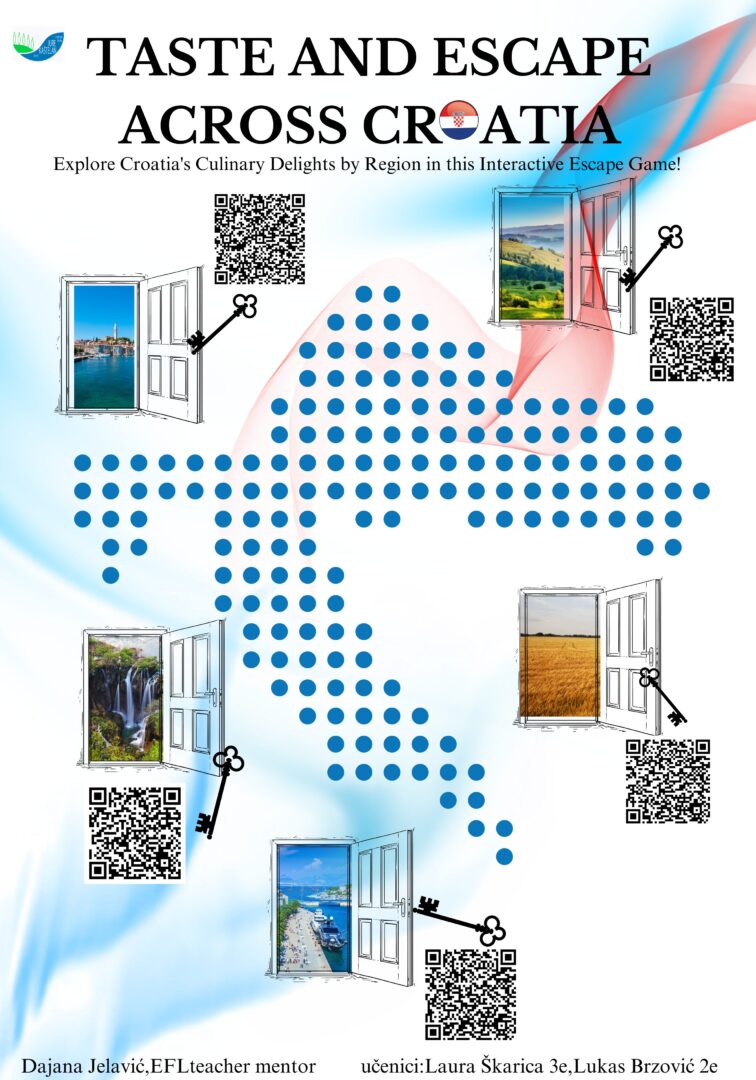
The Future of Scorpaena scrofa in a Changing Mediterranean Ecosystem
Timeline (October–December 2024)
| Month | Activity |
| October | Data collection and preliminary research |
| November | Climate modeling, risk assessment, graph creation |
| December | Synthesis of results, poster creation, final presentation |
Mentor:Dajana Jelavić
Students:3b class
Research Question
How will projected environmental changes over the next 75 years impact the survival and biodiversity of Scorpaena scrofa?
Goal
To analyze the effects of ocean acidification, rising sea temperatures, and salinity changes on the physiological health, reproduction, and habitat of Scorpaena scrofa, highlighting the urgency for targeted marine conservation efforts.
Hypothesis
Ocean acidification, rising sea temperatures, and salinity shifts will severely impact the physiological and ecological viability of Scorpaena scrofa over the next 75 years, increasing the risk of extinction.
Research Methods
- Data Sources:
- Interactive Atlas IPCC (environmental projections)
- Parameters Studied:
- pH tolerance (7.8–8.4)
- Temperature tolerance (8–26 °C)
- Salinity preference (35–40 ppt)
- Analysis:
- Physiological stress and reproductive outcomes modeled against projected environmental conditions.
Research Steps
| Step | Activity | Tools |
| 1 | Data Collection and Analysis: Gathered data on temperature, salinity, and pH changes. Reviewed scientific literature. | IPCC Interactive Atlas, scientific journals |
| 2 | Climate Projections and Ecological Thresholds: Modeled environmental changes over 75 years and compared with species’ tolerance ranges. | Climate modeling tools |
| 3 | Impact Modeling and Risk Assessment: Assessed physiological and reproductive risks, habitat degradation. | Ecological modeling |
| 4 | Conservation Recommendations: Proposed measures to mitigate impacts and support species adaptation. | Synthesis of results |
Expected Results
- Ocean acidification may impair reproduction and increase mortality.
- Rising temperatures could push the species to its upper thermal tolerance, reducing fitness.
- Salinity changes may cause osmotic stress and habitat unsuitability.
- Without intervention, these factors may lead to severe population decline and possible extinction.
Conclusion
Projected environmental changes will significantly threaten the survival of Scorpaena scrofa. Immediate conservation actions are necessary to protect the species and maintain Mediterranean marine biodiversity.
Outputs
- Research poster
- Data visualizations (graphs)
- QR code linking to further resources
- Presentation of results
Click here to learn more about “The Future of Scorpaena scrofa in a Changing Mediterranean Ecosystem”.
Unlocking Potential AI Empowering Neurodivergent Students in EFL Classrooms
Click here to learn more about “Unlocking Potential AI Empowering Neurodivergent Students in EFL Classrooms”.
Using myths for problem-solving
Click here to learn more about “Using myths for problem-solving”.
Znanje zapleteno u mreže
Klikom ovdje saznajte više o projektu “Znanje zapleteno u mreže”.
Školska godina: 2023./2024.
Teenfluencers
Click here to learn more about “Teenfluencers”.
Dalmatian Brunch
Have you heard of “marenda”?
It is an important Dalmatian tradition. Our grandparents ate it in the field when they needed a break from hard work. It is much more than a meal – it’s time to kick back and relax and enjoy a meal with your friends and family in the middle of the day over a glass of “bevanda” – red wine mixed with water. Dalmatian brunch is a traditional ritual, a way of life, social event where you can hear klapa singing and taste delicious but also very simple local dishes made of fresh ingredients.
Time needed:135 min
Go acrostic with AI
Click here to learn more about “Go acrostic with AI”.
At the restaurant
A narrated presentation was created during a Massive Open Online Course (MOOC) titled “Using Educational Technology in the English Language Classroom” by Iowa State University. In this presentation, a speaking activity called “At the Restaurant” is introduced. This activity focuses on ordering food and drinks based on different menus using resources like FORVO, AmericanEnglishSpeakingResources, and YouGlish to enhance speaking and listening skills and improve accuracy and fluency through situation-based dialogues. Participants engage in practical language use while practising pronunciation and communication in a real-life scenario.Time needed:90 min
English Language Quiz
Click here to learn more about “English Language Quiz”.
Creating sustainability together-project (part 1)
Click here to learn more about “Creating sustainability together-project (part 1)”.
Creating sustainability together-project (part 2)
Click here to learn more about “Creating sustainability together-project (part 2)”.
Cetina river wild food
“The Cetina River Wild Food Conservation Project” addresses local challenges by aligning them with the objectives of Sustainable Development Goals (SDGs) 2, 6, 12, 14, and 15.
Students advocate for sustainable solutions through writing social media posts.
Outcomes:
- students will improve awareness of the Cetina River’s diverse wild food and its role in the ecosystem
- increase the sense of responsibility toward sustainable practices
- develop effective communication and advocacy skills in an EFL setting
- apply critical thinking and problem-solving skills to real-world environmental issues.
- successfully address local challenges, aligning with the objectives of Sustainable Development Goals (SDGs) 2, 6, 12, 14, and 15
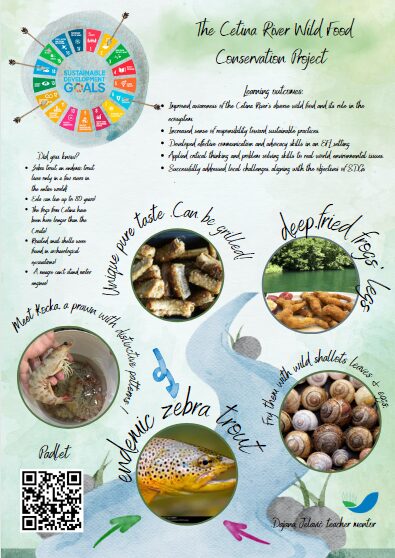

QR code: Cetina
Feast of cultures
“Feast of Cultures” is a school project conducted in the first term of the school year 2023/4. The students chose a food festival in a European country and presented it in a presentation. The development of students’ entrepreneurial competencies was monitored during the project using the tool Loop.me.
Outcomes:
- students will enhance cultural awareness and appreciation for diversity and inclusion
- improve English skills in research, presentation and communication
- develop entrepreneurial skills
- enhance digital literacy skills using technology, multimedia and QR codes
- adopt the culture of continuous improvement
- foster awareness of global interconnectedness and interdependence
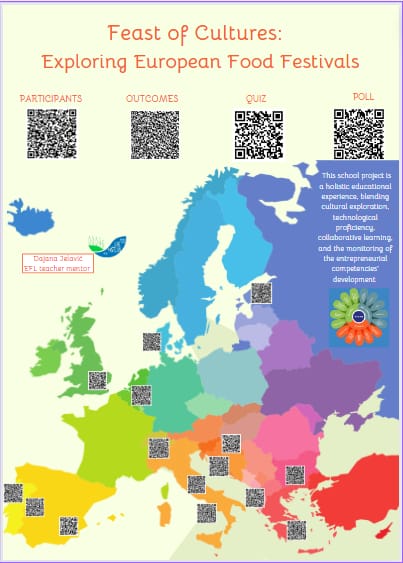
QR codes:
Pool: 
Outcomes: 
Quiz: 
Participants: 